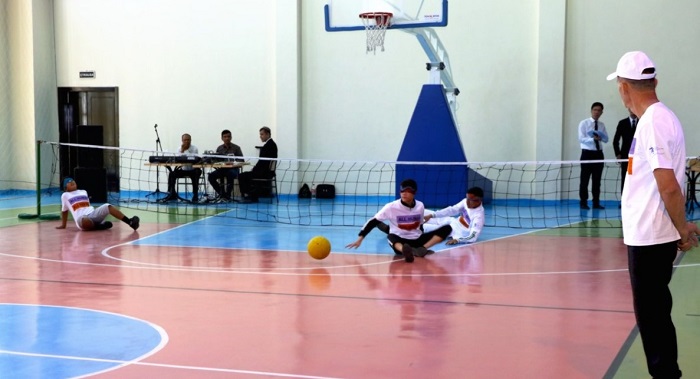Inspiring resilience
Ibragim’s work transcends coaching; it’s about challenging stereotypes and showcasing the unlimited abilities of people with disabilities. He shares the story of Alisher, a student that he coached in sports and who, despite his disability, outshone competitors at an international educational competition, having read 1500 books during 12 years of isolation. “We are people with unlimited abilities,” Ibragim asserts, emphasizing the potential within every individual.
Under Ibragim’s guidance, nearly 60 students have found a sense of purpose and community through sports. He recounts the transformative journey of Hushnur who, through rigorous training, moved from reliance on crutches to playing tennis for 2 hours straight. Ibragim’s dream now is to elevate his students to the international stage, particularly the Paralympic Games, as he steps into the role of a senior coach in the sport of sitting volleyball.
Ibragim’s gratitude extends to WHO and the UN for their dedication to disability inclusion, which has significantly shifted societal attitudes and opened new opportunities for people like him. His story, shared during the Second Inclusive Sport Festival “We are different – We are equal” in Dashoguz, hosted by the Regional Office of the UN High Commissioner for Human Rights in Central Asia and the Office of the UN Resident Coordinator in Turkmenistan on the occasion of the 75th anniversary of the Universal Declaration on Human Rights, is a testament to the power of resilience, the importance of inclusion, and the transformative impact of sports in empowering individuals with disabilities.
As the world commemorates the Universal Declaration on Human Rights, Ibragim’s journey from a person with a disability to an inspiring volleyball coach serves as a beacon of hope and a reminder that we are, indeed, different but equal.
Ibragim’s story echoes the objectives of the WHO European Framework for Action, adopted at the 72nd session of the WHO Regional Committee for Europe, which aims to achieve the highest attainable standard of health for persons with disabilities. The Framework provides a strategic blueprint for enhancing accessibility and eliminating health-care barriers for people with disabilities, reflecting a unified effort to uphold the rights and dignity of every individual.
///Originally published on the official WHO website, 29 February 2024
